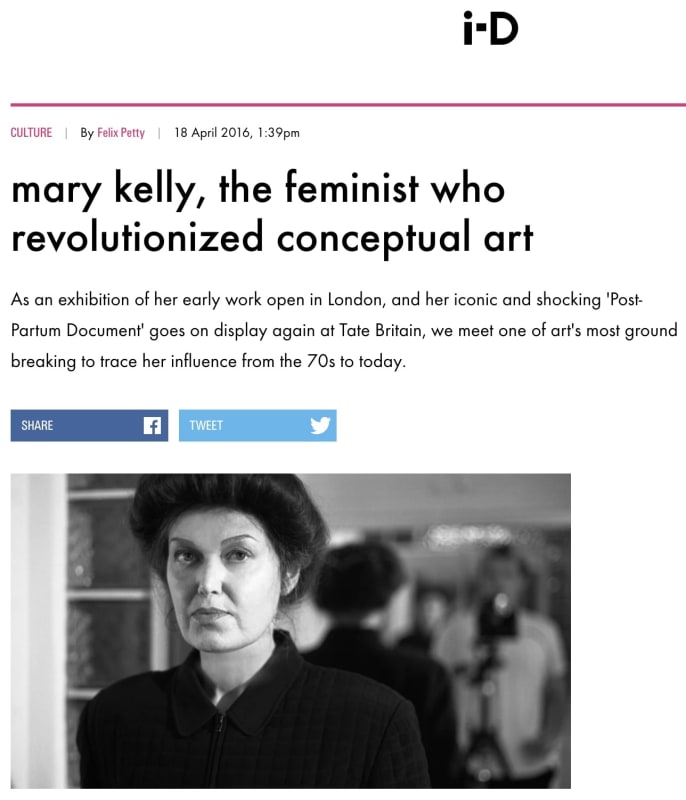It's hard to suggest just how revolutionary the work of Mary Kelly is -- how shocking and new it was in the 70s. She's one of those artists who pushed so far ahead, so successfully, that it's impossible to imagine a time before her work's concerns were commonplace.
That time though was 1976, when she infamously exhibited her son's dirty diapers in the ICA as part of her exhibition, Post Partum Document. The tabloids were shocked, of course, as they often are, but beyond the shock (dirty diapers!) what Kelly so successfully did was open up the world of conceptual art to feminist discourse, gave it an emotional humanism to exist outside of the cold and critical experimentalism that had defined it up until then (other tabloid baiting conceptual art moment of the same time included Carl Andre's Bricks).
Then again, beyond simply conceptualism, she opened up art to a feministic diaristic impulse, an echo of influence that can be keenly felt today in a generation of female artists for whom the personal is still political, if not quite so conceptually rigorous.
Mary Kelly was born in Iowa in 1941, as America entered the Second World War. In the 60s she traveled to Beirut to teach art, leaving as the country descended into civil war. She arrived next in Europe, in 1968, just in time to see the continent convulse with protests, led by French students and anarchists in Paris and intellectually spearheaded by The Situationist International, who called for a revolution of everyday life, a change in everything. It resonated, so she moved to London to study at CSM, joined the Women's Liberation Movement, lived in a commune, met her future husband, had a child, and set about taking on the art world by conceptually documenting the reality of bringing up a child: yes dirty diapers, but also, tracing developments in language and emotions. Post Partum Document is Freuedian psychoanalytical reading of both mother and child.
Her influence can be felt more keenly than ever right now, she's currently exhibiting Post Partum Document at Tate Britain, in the museum's Conceptual Art In Britain show, as well as an exhibition of her early works has just opened at Pippy Houldsworth Gallery in Soho, much of which was made during her time in London in the 70s. "The young generation today knows a lot but it's harder to makes sense of it, or to know how it can have an application in your own lives," she explains, recalling the time these works were made, and how the art world and the world in general has changed. "For my generation it was simple in comparison, we read the theory and changed our lives. Simone De Beauvoir said don't get married, and so we set out to create these different family forms. We tried to live that ideology, but you have so much complication in your existence, that's your inheritance from us."
Of course, we've inherited a lot more from Mary Kelly than that. Now in her mid-70s Mary teaches at UCLA, inspiring another generation of artists, and her most recent work, a series of images made out of lint, traces not only the development of her life and the events that shaped it, but also the echoes of those events in the present. These are works about how the past reappears in the future and how we need to continue to fight for equality.
She began working with lint in the late 90s, when she was making work that dealt with war crimes and genocide and in the Balkans, "struggling" she explains, "with how you can represent how trauma filters into your everyday life. I'd be listening to the news whilst doing the washing, hearing stories of horrific things happening, and realized that lint is this residue of life, its domestic, its the product of a repetitive process." This form has now been turned to other traumas.
"When I was growing up, amid the echo of the Second World War, we thought our parents had totally failed to prevent the holocaust," Mary states. "There's a continuing aspiration though; in the 60s and 70s the protest was a rights movement. It's not even about wages in May 68, but about the quality of life. Now we are trying to maintain something of what has already eroded, to not let it go." The events of May 68 strike a resonant note through her most recent work, as if, like her parents' generation, who failed to prevent the trauma of the Second World War, it weighs on her generation that their great moment of revolutionary energy, their chance to change the world, failed as well. She finds of echoes of that, too, in the Arab Spring; moments of political upheaval she refers to in Freudian terms, as the "political primal scene."
"The mother-child relationship of Post-Partum Document is partly about a traumatic moment of separation," she says, "but it's also about how that fragile individual moment is embedded in grand historical narratives of war and revolution. The wider narrative that you inherit carries those things on in the present; if we don't understand it then history will just repeat itself, which is why we can map that narrative echo of May 68 onto Tahrir Square." Which is what lends the works of lint such power. The softness and fragility of the material pressed into pictures (often she utilizes found images culled from stacks of magazines, and recently the internet) lends a psychological universalism to them, a discreet mapping, that leads from her time living in a commune in London, to a large scale image of Tahrir Square in Cario, for example. "You cant really recapture the past," she says, "but I'm interested in how reappears in the present."

